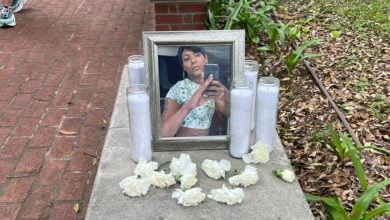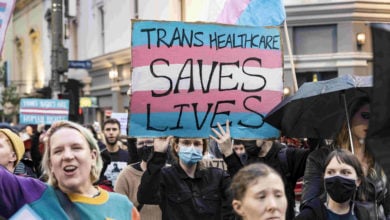On June 30, Nashua, NH, had its first ever, official, citywide Pride celebration. Hundreds of members of the area’s LGBTQ community, joined by their loved ones and comrades in struggle, met downtown on Main Street from 2 p.m. to 5 p.m. for the Nashua Pride Festival. There was a parade and a drag show. There were speakers and musical performances by the TransPosition Vocal Ensemble and the NH Gay Men’s Chorus.
Pride Month is an annual commemoration of the Stonewall uprising, a celebration of the collective struggle and popular aspirations represented by that uprising. The Stonewall uprising took place over a decade before the country’s first openly gay congressperson was elected and decades before the legal right to marry was guaranteed to same-sex couples. At the time, it was common for reactionary police forces to invade gay bars to harass and terrorize the patrons. Police brutality against LGBTQ people continues to be a prevalent feature of U.S. capitalism today. According to the National Transgender Discrimination Survey, more than one in 17 transgender people have been physically assaulted by police officers.
On June 27, 1969, the patrons of the bar at the Stonewall Inn in New York City resisted state violence. When the police evicted them from the bar, gathering them outside on Christopher Street, the targeted individuals fought back collectively with inspiring courage. The police called in backup, arrests were made, and the crowd was eventually dispersed. But the uprising did not end there. The next night and for several nights after that, a multinational revolutionary force of hundreds of working-class queer and trans youth gathered on Christopher Street to march, chanting “Gay Power!” and “We want freedom!” Even though they were only armed with bottles and rocks, and their oppressors were armed with guns and impunity, the youth continued to resist state violence. The next year, 1970, many cities honored the Stonewall uprising and continued its legacy with Christopher Street Liberation Day, a tradition that grew to become Pride Month.
Keeping alive the tradition of struggle, a united front of communists, anarchists and unionists of many ages, gender identities, gender expressions and sexual orientations marched together in Nashua Pride Festival’s parade forming the “Cops out of Pride and our unions” contingent. One of the contingent’s demands was “¡Justicia para Justin Contreras!/Justice for Justin Contreras!” Justin Contreras is a young, working-class father, who had been open with his community about being suicidal. When his concerned mother asked the Nashua police to check on his well-being, three officers went to his apartment, and one of them, James Ciulla, shot him in the chest and arm. Suicide rates in NH rose almost 50 percent between 1999 and 2016, a rapid rate only surpassed by North Dakota and Vermont. It is an outrage that the state’s response is violence and oppression! The shooting took place on June 26. By the time of the Festival, two of the three officers involved were already back on the job!
Almost half a century after the first Christopher Street Liberation Day, it is a major landmark in the development of the working class in NH for the Nashua Pride Festival to take place for the very first time. In many NH towns and cities, there are still no official Pride celebration. Last year, Nashua’s government met the popular demand to recognize Pride Month only by raising the Pride Flag. It is thanks to the impressive hard work of the city’s dedicated LGBTQ activists and their supporters that the local ruling class was forced to recognize Pride Month this year by facilitating—and not completely blocking—the organization of this Festival.
Michael Joseph, a longtime activist and retired music teacher, can recall when homosexuality was considered a “mental illness” and when “people could not even see same-sex marriage on the horizon.” He was 13 years old during the Stonewall uprisings. “Police were bashing heads until the people rose up at Stonewall,” he relates. He traces the movement from Stonewall to the election of Harvey Milk, the first openly gay elected official in the U.S., the AIDS Memorial Quilt, and now to the Nashua Pride Festival.
Joseph is one of many people who worked tirelessly for three months to organize this event. Reflecting on the historic significance of the inaugural Pride Festival, he said his city is finally recognizing the “humanity” of LGBTQ residents like himself: “The idea is to have fun! We’re celebrating, not hiding! For the first time, we feel supported by our city.” He emphasized that not only the LGBTQ community, but also refugees, people with substance use disorders, and many oppressed groups are finally beginning to see progress in their city—“being treated like real people.”
When organizers first began meeting to plan Pride, there was worry that only “four or five people” would table at the event. In an interview with Liberation News just before the Festival, Joseph said: “Now we have almost 50 groups tabling and we have entertainment! Even if Jim Donchess isn’t mayor, because the climate is still here, I can’t imagine there not being a Nashua Pride Festival in 2019. All of the momentum is in place.” Despite progress being imperfect, often unequal and slow, despite the everyday indignations and contradictions of capitalism, there is optimism in the people’s movement. He said, with an energetic smile, “This is a very good time for Nashua!”
Over all, this year has been a major one for the LGBTQ rights movement in NH. In addition to the first Nashua Pride Festival, 2018 has also seen the signing into law of a transgender anti-discrimination bill and the outlawing of so-called conversion therapy for minors. These victories were not gifts from the ruling class but products of grassroots struggle and organizing.






